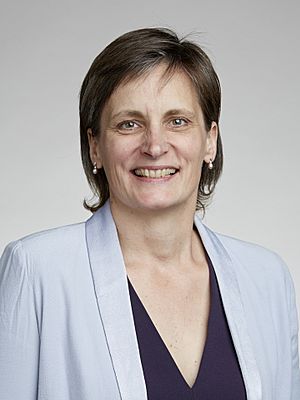Corinne Le Quéré facts for kids
Quick facts for kids
Corinne Le Quéré
|
|
|---|---|

Le Quéré in 2016
|
|
| Born | July 1966 (age 59) Quebec, Canada
|
| Alma mater |
|
| Scientific career | |
| Fields | Climatology |
| Institutions | University of East Anglia |
Corinne Le Quéré (born in July 1966) is a Canadian scientist who studies our planet's climate. She is a top professor of Climate Change Science at the University of East Anglia in the UK. She used to lead the Tyndall Centre for Climate Change Research. Corinne Le Quéré also helps guide important groups like the French High Council on Climate and the UK Climate Change Committee. Her main work is about how the carbon cycle (the way carbon moves around Earth) and climate change affect each other.
Contents
Becoming a Scientist
Corinne Le Quéré studied at several universities to become the expert she is today.
Her University Studies
She earned her first degree in physics from the University of Montreal. After that, she studied Atmospheric and Oceanic Sciences at McGill University. She then went on to get her Ph.D. in oceanography from the University of Paris VI in France.
About Corinne Le Quéré's Life
Corinne Le Quéré was born in Quebec, Canada, in 1966.
Growing Up and Family
When she was a child, her family often went camping in Canada's national parks. This helped her love and care for nature from a young age. After high school, she started her studies at a local university near her home in Gatineau before moving to the University of Montreal to study physics.
Later in life, Corinne Le Quéré also became a British citizen. She has both French and Canadian passports. She is married to her second husband and has a daughter named Marianne from her first marriage. She raised Marianne partly as a single mother.
A Special Radio Show Appearance
On February 3, 2023, Corinne Le Quéré was a guest on a famous BBC radio show called Desert Island Discs. On the show, guests imagine they are stranded on a desert island and choose eight songs, one book, and one luxury item to bring with them. Corinne chose a mask and snorkel as her luxury items. Her favorite song was La Vida Es Un Carnaval by Celia Cruz. For her book, she picked the World Atlas of the Oceans.
Her Work and Discoveries
Corinne Le Quéré has done a lot of important work in climate science.
Leading Climate Research
From 2009 to 2013, she was a co-leader of the Global Carbon Project (GCP). This project helps track how much carbon dioxide is in the atmosphere. She started and led the yearly report called the Global Carbon Budget for over ten years. This report tells us how much carbon is being released and absorbed around the world.
She also helped write the 3rd, 4th, and 5th major reports for the Intergovernmental Panel on Climate Change. These reports are very important because they gather all the scientific information about climate change for governments around the world. She has worked at famous research places like Princeton University in the US and the Max Planck Institute for Biogeochemistry in Germany. She also worked with the British Antarctic Survey in the UK.
Awards and Recognition
Corinne Le Quéré has received many awards for her important work in climate science.
Major Awards and Honors
- In 2012, she won the Claude Berthault award from the French Academy of Sciences.
- In 2015, she received the Blaise Pascal Medal for Earth and Environmental Sciences.
- Also in 2015, she was given the Grande Médaille Albert 1er de Monaco, Science section.
- In 2016, she was chosen as a Fellow of the Royal Society, which is a very high honor for scientists in the UK.
- In 2019, she was made a Commander of the Order of the British Empire (CBE) by the Queen for her services to climate change science.
- Also in 2019, she won the Prince Albert I Medal and was made a Chevalier (Knight) of the French Legion of Honour, which is France's highest award.
- In 2020, she received the Heineken Prize for Environmental Sciences. This award recognized her work on how climate change and the carbon cycle are connected.
Important Research Papers
Corinne Le Quéré has written many scientific papers. Here are a few examples of her work:
- Fossil CO2 emissions in the post-COVID-19 era (2021) – This paper looked at how carbon dioxide emissions changed after the COVID-19 pandemic.
- Temporary reduction in daily global CO2 emissions during the COVID-19 forced confinement (2020) – This research showed how carbon emissions went down for a short time during the COVID-19 lockdowns.
- Global Carbon Budget 2020 (2020) – This is one of the yearly reports she helped create, showing the global picture of carbon emissions and how they are absorbed.
- Drivers of declining CO2 emissions in 18 developed economies (2019) – This paper explored why carbon dioxide emissions were going down in some developed countries.
- Decadal trends in the ocean carbon sink (2019) – This research focused on how the oceans absorb carbon over many years.
 | Frances Mary Albrier |
 | Whitney Young |
 | Muhammad Ali |

